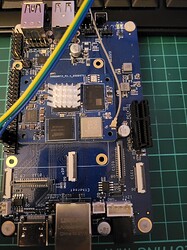Hello. I’m stealing this thread to share logs from booting DietPi on SOQuartz on the SOQuartz Model A Baseboard. Gets stuck. First boot after flashing the SD stops quite early. Second attempt (and upcoming attempts) the boot goes a bit further but stops. See logs from serial output:
First attempt:
Sammanfattning
DDR Version V1.13 20220218
ln
ddrconfig:0
LPDDR4X, 324MHz
BW=32 Col=10 Bk=8 CS0 Row=17 CS=1 Die BW=16 Size=4096MB
tdqss: cs0 dqs0: 24ps, dqs1: -72ps, dqs2: -24ps, dqs3: -72ps,
change to: 324MHz
PHY drv:clk:36,ca:36,DQ:29,odt:0
vrefinner:24%, vrefout:41%
dram drv:40,odt:0
clk skew:0x60
change to: 528MHz
PHY drv:clk:36,ca:36,DQ:29,odt:0
vrefinner:24%, vrefout:41%
dram drv:40,odt:0
clk skew:0x58
change to: 780MHz
PHY drv:clk:36,ca:36,DQ:29,odt:0
vrefinner:24%, vrefout:41%
dram drv:40,odt:0
clk skew:0x58
change to: 1560MHz(final freq)
PHY drv:clk:36,ca:36,DQ:29,odt:60
vrefinner:16%, vrefout:22%
dram drv:40,odt:80
vref_ca:00000071
clk skew:0x12
cs 0:
the read training result:
DQS0:0x30, DQS1:0x30, DQS2:0x34, DQS3:0x2e,
min : 0xe 0xe 0x6 0x2 0x6 0x5 0xe 0xa , 0x6 0x2 0x2 0x2 0x8 0xd 0x12 0xc ,
0xe 0xb 0xb 0x9 0x7 0x2 0x8 0x8 , 0x2 0x2 0x7 0x2 0x9 0x6 0x3 0x2 ,
mid :0x26 0x28 0x20 0x1c 0x1f 0x20 0x26 0x25 ,0x1f 0x1c 0x1b 0x1d 0x21 0x29 0x2c 0x26 ,
0x27 0x26 0x26 0x25 0x22 0x1d 0x23 0x23 ,0x1c 0x1c 0x22 0x1d 0x23 0x22 0x1e 0x1d ,
max :0x3f 0x43 0x3a 0x37 0x38 0x3b 0x3f 0x40 ,0x39 0x37 0x35 0x39 0x3b 0x46 0x46 0x41 ,
0x41 0x41 0x42 0x41 0x3e 0x39 0x3f 0x3f ,0x37 0x36 0x3d 0x38 0x3e 0x3e 0x39 0x39 ,
range:0x31 0x35 0x34 0x35 0x32 0x36 0x31 0x36 ,0x33 0x35 0x33 0x37 0x33 0x39 0x34 0x35 ,
0x33 0x36 0x37 0x38 0x37 0x37 0x37 0x37 ,0x35 0x34 0x36 0x36 0x35 0x38 0x36 0x37 ,
the write training result:
DQS0:0x16, DQS1:0x4, DQS2:0xe, DQS3:0x4,
min :0x66 0x69 0x60 0x5c 0x5e 0x5e 0x66 0x67 0x6a ,0x4b 0x48 0x48 0x49 0x4e 0x55 0x56 0x53 0x4e ,
0x53 0x52 0x53 0x51 0x4d 0x4a 0x4e 0x51 0x50 ,0x43 0x44 0x4b 0x46 0x4b 0x48 0x47 0x48 0x49 ,
mid :0x80 0x82 0x7a 0x76 0x77 0x78 0x7f 0x80 0x82 ,0x67 0x61 0x61 0x62 0x69 0x70 0x6f 0x6d 0x68 ,
0x6f 0x6e 0x6e 0x6e 0x69 0x62 0x68 0x6b 0x6b ,0x5d 0x5f 0x67 0x60 0x67 0x64 0x60 0x61 0x62 ,
max :0x9a 0x9b 0x94 0x91 0x91 0x93 0x99 0x99 0x9b ,0x83 0x7b 0x7b 0x7c 0x84 0x8b 0x89 0x88 0x83 ,
0x8b 0x8b 0x89 0x8b 0x86 0x7b 0x83 0x86 0x87 ,0x77 0x7a 0x83 0x7b 0x83 0x80 0x7a 0x7b 0x7b ,
range:0x34 0x32 0x34 0x35 0x33 0x35 0x33 0x32 0x31 ,0x38 0x33 0x33 0x33 0x36 0x36 0x33 0x35 0x35 ,
0x38 0x39 0x36 0x3a 0x39 0x31 0x35 0x35 0x37 ,0x34 0x36 0x38 0x35 0x38 0x38 0x33 0x33 0x32 ,
CA Training result:
cs:0 min :0x3b 0x38 0x32 0x32 0x37 0x2d 0x38 ,0x3d 0x36 0x38 0x33 0x38 0x2f 0x3b ,
cs:0 mid :0x78 0x7a 0x6e 0x74 0x73 0x6e 0x64 ,0x79 0x75 0x76 0x73 0x74 0x6e 0x68 ,
cs:0 max :0xb5 0xbd 0xab 0xb6 0xaf 0xaf 0x91 ,0xb5 0xb5 0xb4 0xb3 0xb1 0xae 0x95 ,
cs:0 range:0x7a 0x85 0x79 0x84 0x78 0x82 0x59 ,0x78 0x7f 0x7c 0x80 0x79 0x7f 0x5a ,
out
rockchip_sdram_size fdc20208 10000201
rank 1 cs0_col 10 bk 3 cs0_row 17 bw 2 row_3_4 0
SDRAM base=0, size=100000000
U-Boot SPL 2022.04-rc2 (Nov 09 2022 - 00:02:16 +0000)
saradc@fe720000: Can't update Vdd. Error: -38saradc@fe720000: Can't update Vss. Error: -38powerdomain init.
rockchip_sdhci_probe clk set rate fail!
Trying to boot from MMC1
mmc_load_image_raw_sector: mmc block read error
Trying to boot from MMC1
mmc_load_image_raw_sector: mmc block read error
Trying to boot from MMC2
mmc_load_image_raw_sector: mmc block read error
SPL: failed to boot from all boot devices
### ERROR ### Please RESET the board ###
After reset (pastebin)
Using SD Sandisk Extreme 64GB. Sucessfully boots Manjaro and Armbian on the same SD although fails to flash the bcm43455, can still connect to wifi with nmcli on Armbian.
I’m available to test any new developments
